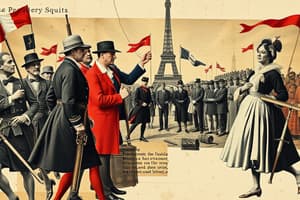Podcast
Questions and Answers
What did the Parisian women demand when they marched to Versailles?
What did the Parisian women demand when they marched to Versailles?
- Abolition of the monarchy
- Lower taxes
- Political representation
- More bread (correct)
Why did the Parisians demand that Louis and his family return to Paris with them?
Why did the Parisians demand that Louis and his family return to Paris with them?
- To protect the monarch from potential threats
- To exile the monarch from Paris
- To negotiate a peace treaty
- To keep the monarch under the watchful eye of the people (correct)
What event led to the king agreeing to sanction the decrees of the Assembly?
What event led to the king agreeing to sanction the decrees of the Assembly?
- The decline in the price of bread
- The relocation of the National Constituent Assembly to Paris
- The 7,000 Parisian women armed with pikes marching to Versailles (correct)
- The ratification of the Declaration of the Rights of Man and Citizen
What led to the relative stability and peace in Paris and France until the summer of 1792?
What led to the relative stability and peace in Paris and France until the summer of 1792?
What type of monarchy did the National Constituent Assembly pursue?
What type of monarchy did the National Constituent Assembly pursue?
What did the Assembly seek to protect, following the principles of the Declaration of the Rights of Man and Citizen?
What did the Assembly seek to protect, following the principles of the Declaration of the Rights of Man and Citizen?
Who could vote according to the Constitution of 1791?
Who could vote according to the Constitution of 1791?
What did Olympe de Gouges advocate for in her Declaration of the Rights of Woman?
What did Olympe de Gouges advocate for in her Declaration of the Rights of Woman?
What did the National Constituent Assembly establish as a major political authority?
What did the National Constituent Assembly establish as a major political authority?
How were citizens of France divided for the purpose of elections?
How were citizens of France divided for the purpose of elections?
What did the National Constituent Assembly seek to limit the impact on?
What did the National Constituent Assembly seek to limit the impact on?
What did the National Constituent Assembly seek to protect in the Constitution of 1791?
What did the National Constituent Assembly seek to protect in the Constitution of 1791?
What did the National Constituent Assembly establish as a political authority?
What did the National Constituent Assembly establish as a political authority?
What did the National Constituent Assembly seek to protect in the Constitution of 1791?
What did the National Constituent Assembly seek to protect in the Constitution of 1791?
What did Olympe de Gouges advocate for in her Declaration of the Rights of Woman?
What did Olympe de Gouges advocate for in her Declaration of the Rights of Woman?
How were citizens of France divided for the purpose of elections?
How were citizens of France divided for the purpose of elections?
Flashcards are hidden until you start studying
Study Notes
The French Revolution
- On October 5, 1789, Parisian women marched to Versailles, demanding bread and the king's acceptance of the National Assembly's decrees.
- The Parisians wanted Louis XVI and his family to return to Paris with them, fearing the king would flee and abolish the reforms.
- The event that led to the king's agreement to sanction the decrees was the October 5-6, 1789, march on Versailles and the subsequent siege of the palace.
The National Constituent Assembly
- The National Constituent Assembly pursued a constitutional monarchy, establishing a system of government where the king's powers were limited by a constitution.
- The Assembly sought to protect individual rights and liberties, following the principles of the Declaration of the Rights of Man and Citizen.
- Active citizens, defined as males aged 25 or older who paid a certain amount of taxes, were eligible to vote according to the Constitution of 1791.
- Olympe de Gouges advocated for women's rights and equality in her Declaration of the Rights of Woman.
Electoral System
- The National Constituent Assembly established a system of electoral assemblies, which were divided into two categories: active and passive citizens.
- The Assembly sought to limit the impact of absolute monarchy on the government.
- The Assembly protected individual rights and liberties, as well as the principles of the Declaration of the Rights of Man and Citizen, in the Constitution of 1791.
- The Assembly established the Legislative Assembly as a major political authority.
- The citizens of France were divided into active and passive citizens for the purpose of elections, with active citizens being eligible to vote.
Studying That Suits You
Use AI to generate personalized quizzes and flashcards to suit your learning preferences.




